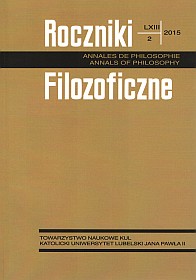Tożsamość bez zróżnicowania w mistycznej myśli Mistrza Eckharta
Abstrakt
Mistrz Eckhart, postać niejednokrotnie bardzo kontrowersyjna, cieszy się ogromnym zainteresowaniem zarówno wśród teologów, filozofów, a przede wszystkim mistyków. Głównym powodem tej uwagi jest jego koncepcja dotycząca zjednoczenia mistycznego, która opiera się głównie na zagadnieniu iskierki duszy oraz niższej części duszy, która staje się wręcz tożsama z Bogiem. Według Eckharta z jednej strony jesteśmy zrodzeni, natomiast z drugiej strony nie jesteśmy, ponieważ powinniśmy oczekiwać zrodzenia w niższej części duszy. „Narodzenie Boga w duszy” – tak Mistrz Eckhart określa zjednoczenie mistyczne, które należałoby, według niego, umieścić w swoistych kategoriach przebóstwienia. Źródłem zaś całej idei przebóstwienia jest nic innego, jak silne podobieństwo między Bogiem i człowiekiem, a dokładnie jego duszą. Nietrudno odnaleźć tu liczne podobieństwa, które z łatwością można dostrzec między myślą Eckharta i myślą neoplatoników pogańskich – Plotyna czy Proklosa. Istnieje wiele przesłanek, że Mistrz Eckhart próbuje połączyć idealistyczną filozofię neoplatońską z czysto racjonalną filozofią Tomasza z Akwinu, jednak aspekty Akwinaty są w myśli Mistrza Eckharta niemal niezauważalne. Wydaje się, że liczne trudności związane z interpretacją jego poglądów wynikają z ewidentnego braku podstaw metafizyki w jego dziełach. Jest to nieco dziwne, biorąc pod uwagę fakt, że Mistrz Eckhart doskonale znał poglądy Tomasza z Akwinu, który w sposób jednoznaczny wypracował koncepcję bytu.
Proces zjednoczenia jest w myśli Eckharta przedstawiony w kontekście poznawania. Intelekt stanowi tę władzę w bycie ludzkim, dzięki któremu może on pozostawać w nieustannym związku z Bogiem, co pozwala mu na wznoszenie się. Droga do zjednoczenia z Bogiem zawsze zatem będzie drogą ku Najwyższemu Intelektowi poprzez doskonalenie intelektu w sobie samym. Jest to jednak proces, który wymaga swoistego wyjścia z siebie samego. Wyjście to polega na swego rodzaju dążeniu do jak największej prostoty, co polega na odrzuceniu wszelkiej różnorodności oraz inności. Pojawia się zatem ubóstwo rozumiane w sposób zupełnie paradoksalny, ponieważ w konsekwencji zjednoczenia z Bogiem jawi się ono jako największe bogactwo.
Warto jednocześnie pamiętać, że ów mistyczny kontakt z Bogiem nie jest czymś zupełnie zewnętrznym dla człowieka. Otóż zjednoczenie mistyczne nie polega na wznoszeniu się duszy do Boga, lecz na ujawnieniu Boga w niższej części duszy, wyższa bowiem część duszy, czyli iskierka duszy, już jest tożsama z Bogiem. Narodziny Boga to uczestnictwo niższej części duszy w szczęściu iskierki duszy. Eckhart wyraźnie wskazuje, że są to narodziny Syna w duszy, które jednak nie oddala duszy od Ojca. Jest to nadal ten sam rodzaj jedności. Zostaje wręcz zniesiona wszelka jednostkowość człowieka, zaciera się jego tożsamość. Ta ontologiczna jedność z samym Bogiem jest jednocześnie jednością z dobrem w najwyższym wymiarze, dlatego też zacierają się wszelkie dylematy moralne, które rozstrzygają się dzięki zupełnej jedności, w której tożsamość bytu ludzkiego z Bogiem nie ma żadnego zróżnicowania.
Bibliografia
Albert, Karl. „Epilogue: Meister Eckhart – between Mysticism and Philosophy”. W: A Companion to Meister Eckhart, red. Jeremiah H. Hackett. Leiden–Boston: Brill, 2013.
Augustyniak, Piotr. „O Eckharcie i przezwyciężeniu metafizyki”. Znak z. 2 (nr 657) (2010): 91–101.
Beierwaltes, Werner. Platonizm w chrześcijaństwie, tł. Piotr Domański. Kęty: Antyk, 2003.
Böhner, Philotheus, Étienne Gilson. Historia filozofii chrześcijańskiej od Justyna do Mikołaja Kuzańczyka, tł. Stanisław Stomma. Warszawa: PAX, 1962.
Dinzelbacher, Peter. Leksykon mistyki. Żywoty – pisma – przeżycia, tł. Bogusław Widła. Warszawa: Verbinum, 2002.
Kaźmierczak, Zbigniew. Paradoks i zbawienie. Antropologia mistyczna Mistrza Eckharta i Jana od Krzyża. Białystok: Trans Humana, 2009.
Kern, Udo. „Eckhart’s Antropology”. W: A Companion to Meister Eckhart, red. Jeremiah H. Hackett. Leiden–Boston: Brill, 2013.
McGinn, Bernard. Mistyczna myśl Mistrza Eckharta – człowieka, przed którym Bóg niczego nie skrył, tł. Sebastian Szymański. Kraków: Wydawnictwo UJ, 2009.
Mistrz Eckhart. Kazania, tł. Wiesław Szymona. Poznań: W drodze, 1986.
Otto, Rudolf. Mistyka Wschodu i Zachodu. Analogie i różnice wyjaśniające jej istotę, tł. Tomasz Duliński. Warszawa: KR 2000.
Szymona, Wiesław. Mistrz Eckhart – mistyk codzienności, http://www.deon.pl/religia/swiety-patron-dnia/art,151,mistrz-eckhart-mistyk-codziennosci.html (10.07.2014.).
Szymona, Wiesław. „Wstęp”. W: Mistrz Eckhart. Kazania, tł. Wiesław Szymona. Poznań: W drodze, 1986.
Copyright (c) 2015 Roczniki Filozoficzne

Utwór dostępny jest na licencji Creative Commons Uznanie autorstwa – Użycie niekomercyjne – Bez utworów zależnych 4.0 Międzynarodowe.





